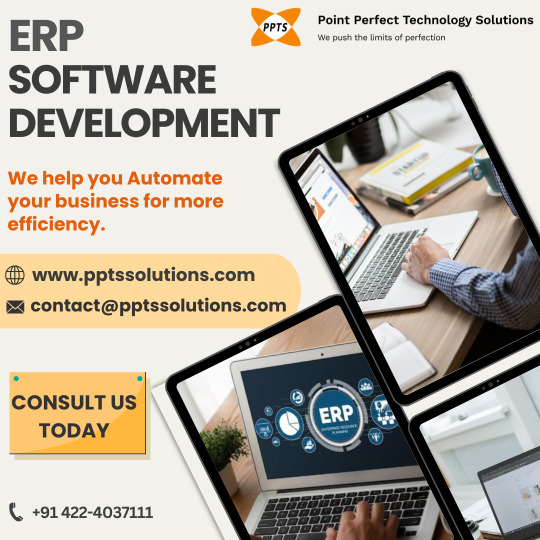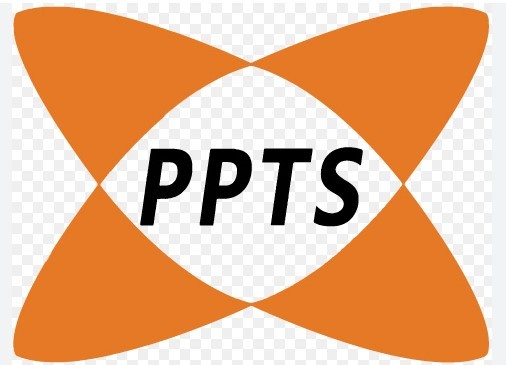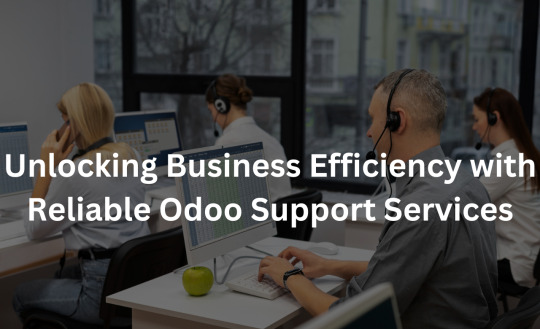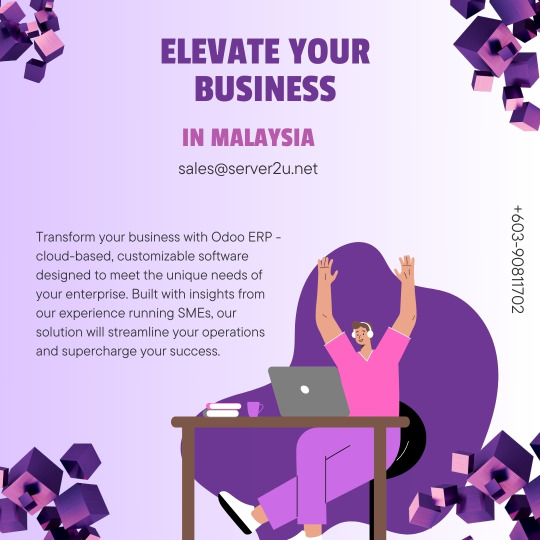#odoo support services
Explore tagged Tumblr posts
Text
Best Odoo Support Services to Keep Your ERP Running Smoothly
Keep your ERP system optimized, secure, and hassle-free with professional assistance tailored to your business needs. Our team provides prompt technical help, system upgrades, issue resolution, and ongoing maintenance to ensure maximum system efficiency. With dedicated odoo support services , businesses can address performance issues, fix module errors, and manage customizations without disrupting daily operations. These services also cover proactive system monitoring, user training, and timely updates, ensuring your ERP platform stays reliable as your company evolves. Whether you’re running a simple Odoo setup or a complex multi-module configuration, we deliver scalable, business-focused solutions that let you focus on growth while we handle the technical side of your ERP.
1 note
·
View note
Text
Odoo Support: Keep Your ERP Running at Peak Performance
Implementing an ERP system like Odoo is a game-changer for business efficiency. But the real value lies in consistent performance, minimal downtime, and ongoing improvements. That’s why Odoo Support is essential—not just to fix issues, but to ensure your system evolves with your business.
Whether you're a new user or a seasoned Odoo enterprise, having access to professional Odoo support services ensures your ERP investment delivers long-term results.
Why Odoo Support Matters
Odoo is an incredibly powerful and customizable open-source ERP system. However, its true potential is unlocked only with the right support in place. From managing day-to-day technical glitches to ensuring functional alignment with your operations, Odoo support and maintenance is the key to sustainable performance.
With dedicated support, businesses can:
Resolve system issues quickly
Ensure data integrity and system security
Keep modules up-to-date and compliant
Receive expert guidance on upgrades and customizations
Types of Odoo Support Services You Need
Depending on your business needs, Odoo support can be categorized into different areas. Let’s explore:
1. Odoo Technical Support
This involves fixing backend issues like bugs, server problems, performance bottlenecks, or integration errors. Skilled developers handle these problems to maintain system reliability and performance.
2. Odoo Functional Support
Here, experts help users understand and use Odoo modules efficiently. Odoo Functional support includes process optimization, module usage assistance, and best practice recommendations.
3. Odoo Support and Maintenance
A full-stack service that includes proactive monitoring, troubleshooting, patch management, and regular updates. This ensures smooth ERP performance without downtime.
4. Odoo Live Chat Support & Odoo Chat Support
For businesses that need immediate assistance, Odoo live support options like live chat and Odoo support chat provide instant communication with ERP specialists. This real-time support reduces wait times and helps resolve urgent queries faster.
Flexible Odoo Support Packs
Odoo partners and service providers offer various Odoo support packs tailored to different business sizes and support needs. Whether you need support for a few hours a month or a dedicated team round-the-clock, there’s a plan to match your requirements and budget.
These packs typically include:
Ticket-based issue resolution
Emergency support
System health checks
Training sessions
Module customization support
The Role of the Odoo Support Module
The Odoo support module allows businesses to track support tickets, assign them to relevant teams, and ensure timely resolution. It's an efficient way to manage internal and external support queries with transparency and accountability.
Choosing the Right Odoo ERP Support Partner
A reliable Odoo ERP support partner can make a significant difference in your ERP experience. Choose a team with proven expertise in both technical and functional support, and one that understands your industry.
Things to consider:
Availability of 24/7 or timezone-specific support
Multi-channel support (email, live chat, phone)
Transparent ticketing and resolution processes
Customizable support packages
Post-upgrade and migration assistance
Get Reliable, Expert Odoo Support Today
No matter how good your ERP is, without proper support, it can slow down operations and lead to costly errors. With our expert Odoo support services, you’ll never face ERP challenges alone. From quick fixes to long-term maintenance and live assistance, we've got you covered.
🚀 Let’s make your ERP work smarter. Contact us now for a free consultation or explore our flexible Odoo support packs to keep your system optimized and future-ready.
👉 Talk to an Expert | Request Odoo Live Chat Support
0 notes
Text
Odoo Support — Key Factors to Consider When Choosing for Your Business
Searching Odoo support? Think about their skills, the services they offer, how fast they help, if they can customize for your needs, the cost of their reputation, if they can grow with your business, and if they provide training. The right provider will help your business run smoothly and grow successfully.
0 notes
Text
Odoo Support Services | Odoo ERP Support & Maintenance
Get expert Odoo ERP support & maintenance services from the iVenture Team to optimize your ERP system performance. iVenture Team provides excellent Odoo ERP support services, resulting in optimum system performance and ongoing enhancement. With our Odoo support service, your business system works smoothly so you focus on scaling.
0 notes
Text
Odoo Advanced Search | Odoo16
Odoo Advanced Search Application is a user-friendly tool that enhances search capabilities in the Odoo ERP system. It offers customizable filters, advanced search options, and seamless integration with multiple modules. Retrieve relevant data efficiently, and improve overall data management.
Synodica Solution, an officially Certified Odoo Partner, offers a range of services including Odoo erp development, odoo erp customization, odoo erp migration, odoo erp implementation, odoo erp support and odoo training. We are Odoo consultant and developers offering 360 degree Odoo ERP solutions to grow your business.
youtube
#web developers#web development#technology#odoo apps#odoo advanced search#odoo list view manager#odoo ERP implementation company#Odoo Support Services#odoo data migration#Odoo customization Implementation#odoo development#Youtube
1 note
·
View note
Text
youtube
Integrate Bigcommerce with your Odoo ERP in the easiest way with our Bigcommerce module specially designed with your e-commerce requirements in mind. Import your online orders, contacts, and invoices to process them further in your Odoo ERP with ease updating your Odoo inventory on the fly. Thus giving you an extended functionality to integrate the most popular e-commerce platform with the most versatile ERP framework. Explore the power of Odoo ERP integration, including seamless odoo ERP third-party app integration, to enhance your business processes and maximize efficiency.
#business#odoo ERP Integration#wordpress odoo erp integration#Odoo CRM & ERP Integration Services#odoo erp Third Party app Integration#odoo erp implementation#odoo migration services#odoo support services#odoo erp software development#odoo erp customization#Youtube
0 notes
Text
Who’s Leading Odoo Development in Kuwait? Here Are the Top 5

When it comes to managing modern business operations, flexibility, scalability, and automation are no longer optional-they're essential. That’s exactly why more businesses in Kuwait are turning to Odoo ERP comprehensive open-source platform that’s redefining enterprise management.
But here’s the real question: with so many ERP providers in the market, who’s leading the Odoo development scene in Kuwait?
In this blog, we’re diving into the top 5 Odoo development companies in Kuwait that are making a real impact by delivering customized, business-ready ERP solutions across industries.
Why Odoo ERP Is Gaining Ground in Kuwait
Let’s start with the basics. Odoo is a fully modular ERP system that offers an integrated suite of apps-from CRM, sales, inventory, and accounting, to project management, HR, and more. Businesses love Odoo because it’s user-friendly, highly customizable, and significantly more affordable than legacy ERP platforms.
In Kuwait’s fast-growing economy-where retail, real estate, healthcare, oil & gas, and logistics sectors are booming-Odoo ERP software provides the flexibility and automation Kuwaiti businesses need to stay competitive.
However, to fully unlock its benefits, you’ll need an experienced Odoo implementation partner in Kuwait-and that’s where these top players come in.
What Makes a Great Odoo Developer?
Choosing an Odoo ERP development company isn’t just about technical skills. It’s about finding a team that understands your business challenges, offers strategic insights, and delivers long-term value.
The top Odoo developers in Kuwait typically offer:
Custom Odoo module development
Third-party app integrations
Odoo migration & upgrades
Local compliance and Arabic language support
Ongoing Odoo ERP support and maintenance
Let’s explore the companies that are leading the charge.
Top 5 Odoo Development Companies in Kuwait
1. Centrix Plus – Kuwait’s Odoo Powerhouse
Centrix Plus is a well-established name in Odoo ERP development in Kuwait, offering tailor-made ERP solutions for SMEs and large enterprises alike. Known for their hands-on consulting approach and in-depth domain knowledge, Centrix Plus delivers fully integrated and scalable Odoo systems. From CRM automation to accounting integration, they cover it all-making them a top choice for businesses that need a partner, not just a provider.
Specialties:
Odoo ERP implementation
Module customization
Cloud-based Odoo solutions
Real-time analytics dashboards
2. ERPify – Making ERP Simple and Scalable
ERPify specializes in helping businesses streamline their operations with customized Odoo ERP development services tailored to Kuwait’s unique business landscape. They’re ideal for SMEs looking for fast, efficient ERP deployment without the corporate complexity.
Highlights:
Quick Odoo onboarding
User training and support
API integrations
Affordable pricing for startups
3. Gulf ERP Solutions – Industry-Focused ERP Implementations
If your business operates in retail, distribution, or logistics, Gulf ERP Solutions is a smart pick. Their domain-specific Odoo applications and robust implementation processes make them one of the most reliable Odoo developers in Kuwait.
Key Offerings:
Full-cycle Odoo ERP development
Localized workflows
Arabic interface support
Enterprise-grade Odoo customization
4. TechnoSoft Kuwait – Experts in Odoo Migration & Integration
TechnoSoft is known for their ability to seamlessly transition businesses from outdated systems to a dynamic Odoo ERP environment. Their migration services are precise and secure, backed by strong technical support.
Strengths:
Odoo database migration
Legacy system integration
Advanced reporting tools
Bug-free deployment
5. Al-Murad IT – Building Long-Term ERP Success
Al-Murad IT takes a consultative approach to Odoo ERP consulting and development in Kuwait. They go beyond implementation, focusing on long-term optimization, performance tuning, and strategic support.
Service Highlights:
End-to-end Odoo customization
Long-term SLA support
E-commerce & POS integration
Custom dashboards and KPIs
Final Thoughts: Choosing the Right Odoo Partner in Kuwait
Your ERP system is the backbone of your business operations. Choosing the right Odoo partner in Kuwait is a decision that deserves careful thought. Whether you're launching your first ERP or upgrading an existing setup, these companies have the experience, local insight, and technical talent to help you succeed.
If you’re looking for a fully customized Odoo solution, consider working with a team like Centrix Plus, which can guide you from planning through deployment, even beyond.
Ready to Transform Your Business with Odoo?
At Centrix Plus, we don’t just build ERP systems-we build business success. Contact our team to learn how our Odoo development services in Kuwait can help you automate operations, save time, and scale with confidence.
Request Your Free Odoo Consultation Today!
#Odoo ERP Kuwait#Best ERP Software Kuwait#Odoo Implementation Services Kuwait#Affordable ERP Solutions Kuwait#Top Odoo Partner Kuwait#Custom Odoo Development Kuwait#Odoo Accounting Software Kuwait#Odoo Inventory Management Kuwait#Kuwait VAT Compliance Odoo#Odoo Cloud Hosting Kuwait#Odoo Training and Support Kuwait#Arabic Odoo ERP Kuwait#Odoo for SMEs in Kuwait
0 notes
Text
Why Kuwaiti Businesses Are Choosing Odoo for Their ERP Needs

Kuwait’s economy is thriving, with businesses across industries like oil and gas, retail, logistics, and finance embracing digital transformation to stay competitive. In this fast-paced landscape, Enterprise Resource Planning (ERP) systems have become indispensable tools for growth. Among the solutions gaining traction, Odoo ERP is a favorite for Kuwaiti businesses.
But why? At Centrix Plus, Kuwait’s trusted partner for Odoo implementation and customization, we’ve witnessed firsthand how this open-source platform is revolutionizing local operations. Here’s why Kuwaiti companies are making the switch to Odoo.
1. Cost-Effective Flexibility for Growing Businesses
Kuwaiti SMEs and large enterprises alike prioritize solutions that deliver value without breaking the bank. Odoo’s modular structure allows businesses to start with essential apps (like accounting, inventory, or CRM) and scale up as needed. Unlike rigid, pre-packaged ERP systems, Odoo’s pay-as-you-grow model aligns perfectly with Kuwait’s dynamic market, where agility is key.
Centrix Plus Insight:We’ve helped Kuwaiti startups and conglomerates customize Odoo modules to fit their budgets, eliminating the need for costly overhauls down the line.
2. Local Compliance Made Simple
Kuwait’s regulatory environment demands precision, including VAT and financial reporting standards. Odoo’s localization features for the Middle East ensure compliance with Kuwaiti laws, from Arabic-language interfaces to automated tax calculations.
Did You Know?Centrix Plus offers Kuwait-specific Odoo customizations, such as Zakat reporting and integration with local banking systems, ensuring seamless adherence to regional requirements.
3. Scalability to Match Kuwait’s Ambitions
With Kuwait Vision 2035 driving economic diversification, businesses need ERP systems that grow with their goals. Odoo’s cloud-based infrastructure supports scalability, whether a company is expanding its warehouse in Shuwaikh or launching an e-commerce platform across the GCC.
Real-World Example:A Kuwaiti logistics firm partnered with Centrix Plus to implement Odoo’s fleet management and route optimization modules. Within months, they reduced delivery times by 30% and scaled operations to serve Saudi Arabia and the UAE.
4. Seamless Integration with Existing Tools
Many Kuwaiti businesses rely on legacy software or niche tools for industry-specific tasks. Odoo’s open-source API allows effortless integration with third-party systems, from government portals to custom POS setups in Kuwaiti retail stores.
Centrix Plus Advantage:Our developers specialize in bridging Odoo with Kuwait’s most-used platforms, ensuring minimal disruption during implementation.
5. Unmatched Customization for Kuwait’s Unique Needs
Kuwait’s market has distinct challenges, from managing seasonal demand during Ramadan to handling complex supply chains. Odoo’s flexible framework lets businesses tailor workflows to their exact needs.
Case in Point:A Kuwaiti construction company used Centrix Plus to build a custom Odoo module for project cost tracking, slashing budget overruns by 22% and improving stakeholder transparency.
Why Centrix Plus is Kuwait’s Go-To Odoo Partner
While Odoo’s benefits are clear, successful implementation requires local expertise. Here’s how Centrix Plus empowers Kuwaiti businesses:
In-Depth Regional Knowledge: We understand Kuwait’s business culture, regulations, and pain points.
24/7 Arabic/English Support: From Salmiya to Jahra, our team provides round-the-clock assistance.
Industry-Specific Solutions: Tailored Odoo setups for healthcare, trading, manufacturing, and more.
Post-Implementation Training: We ensure your team maximizes Odoo’s potential.
The Future of ERP in Kuwait Starts with Odoo
Kuwait’s businesses are no longer settling for one-size-fits-all ERP systems. With Odoo’s adaptability, cost efficiency, and localization strengths—paired with Centrix Plus’s expertise—companies are future-proofing their operations while staying rooted in Kuwait’s unique market demands.
Ready to Join the Odoo Revolution?
Contact Centrix Plus today to schedule a free consultation. Let us show you how Odoo can streamline your workflows, boost profitability, and position your business as a leader in Kuwait’s digital economy.
#Odoo ERP Kuwait#Best ERP Software Kuwait#Odoo Implementation Services Kuwait#Affordable ERP Solutions Kuwait#Top Odoo Partner Kuwait#Custom Odoo Development Kuwait#Odoo Accounting Software Kuwait#Odoo Inventory Management Kuwait#Kuwait VAT Compliance Odoo#Odoo Cloud Hosting Kuwait#Odoo Training and Support Kuwait#Arabic Odoo ERP Kuwait#Odoo for SMEs in Kuwait#Odoo POS System Kuwait#Odoo HR Module Kuwait
0 notes
Text
Customizing Odoo ERP to Meet Your Business Needs

Introduction to Odoo ERP Customization
Businesses need robust and flexible ERP systems that can adjust to their specific processes and workflows in the fast-paced commercial world of today. One unique feature of Odoo ERP is its outstanding level of customization, which enables it to meet a variety of corporate needs. Because of its modular design, Odoo enables companies to add or change functionality to suit their needs and guarantee a customized fit. This article will discuss how working with an Odoo implementation partner can improve your Odoo ERP software development and implementation process, as well as the customization choices accessible in Odoo ERP.
Understanding Odoo ERP Customization
Numerous modules covering different business operations including sales, inventory, accounting, HR, and more are available with Odoo ERP. It's simple to create and modify these modules so that they work with your business procedures. Odoo customization can take many forms, from straightforward changes to module settings to more intricate projects like adding new modules or connecting external apps. Because of its adaptability, Odoo ERP is the best option for companies trying to increase productivity and optimize processes.
Key Customization Options in Odoo ERP
Module Configuration: Module configuration is among the most basic ways to customize Odoo. Every module has some default options that you can change to suit your needs as a business. For instance, you can set up customer segmentation, discount schemes, and pricing regulations in the sales module to complement your sales approach.
Workflow Automation: To increase productivity and decrease manual involvement, you can automate a variety of workflows using Odoo. Workflows can be tailored to do particular tasks in response to pre-established criteria. For example, you can automate the purchase order approval procedure or schedule automated reminders for past-due payments.
Custom Dashboards and Reports: Every company has different reporting requirements. With Odoo, you can design personalized dashboards and reports that offer insightful analysis of your business processes. Reports can have their layout, data fields, and graphics altered to suit your unique needs.
New Module Development: Odoo supports the creation of new modules in case the current ones don't adequately meet your demands. This entails developing unique apps that work in unison with the main Odoo system. You can create and implement bespoke modules that are suited to your company processes with the assistance of an Odoo implementation partner with experience in Odoo ERP software development.
Third-Party Integrations: Odoo's capabilities can be increased by integrating it with a number of different third-party programs. Odoo's open architecture makes it feasible to interact with other business tools, payment gateways, and e-commerce platforms. These integrations make sure that every system in your company functions as a whole.
Real-World Examples of Odoo Customization
Customized Odoo ERP solutions have proven beneficial for a multitude of enterprises. For instance, by tailoring the stock module to track product variations and more efficiently manage warehouse locations, a retail company was able to optimize its inventory management process. Stockouts were significantly reduced as a result of this adjustment, and order fulfillment times were expedited.
In another instance, a manufacturing business created a unique module to control its production schedule. Real-time visibility into production capacity and demand was made possible by the module's integration with the current manufacturing and sales modules. The organization was able to cut lead times and enhance its production operations thanks to this customization.
Conclusion
Customizing Odoo ERP to your unique business requirements can completely change the way you run your company, resulting in more productivity, wiser choices, and happier clients. Your Odoo ERP software development and implementation journey will be successful thanks to Odoo's versatility and an experienced Odoo implementation partner. Through the complete utilization of Odoo's customization functionalities, enterprises can attain a customized ERP system that stimulates expansion and creativity.
In conclusion, Odoo ERP offers a wide range of customization possibilities, including the ability to integrate third-party apps, create new modules, and configure existing ones. You may successfully navigate these choices and put in place a solution that precisely matches your business needs by working with a certified Odoo partner.
#Odoo#Odoo ERP#Odoo ERP Implementation#odoo erp software#odoo services#odooimplementation#odoo support#Business Needs#ahextechnologies
0 notes
Text

Enhance the overall performance and security of your Odoo system with our specialized support and maintenance services. Our team of experts works diligently to ensure that your system operates at peak efficiency while safeguarding it against potential security threats.
Learn More: https://www.inwizards.com/odoo-services/odoo-support-and-maintenance-services.php
Get in touch -
Enquire Now - IND +91-9667584436 / UAE +971 52 510 4292
Email - [email protected]
#inwizards software technology#odoo development company#odoo development services#odoo services#odoo#Odoo Support and Maintenance Services#Odoo Support and Maintenance
0 notes
Text

Top Benefits of Odoo ERP for Multi-Branch Businesses
Managing multiple business branches presents unique challenges, such as maintaining consistency, ensuring efficient communication, and consolidating data across locations. Odoo ERP addresses these challenges with a range of features specifically designed for multi-branch management:
Centralized Management:
A unified platform provides centralizes data from all branches, providing a single source of truth for the entire organization. This platform standardizes processes and procedures across all branches, ensuring uniformity and compliance.
Improved Communication:
Inter-branch collaboration is facilitated through integrated messaging and collaborative tools, ensuring that communication and cooperation between branches are seamless. Additionally, real-time updates ensure that all branches have instant access to the latest information and updates.
Efficient Resource Allocation:
Inventory management enables efficient tracking and management of inventory across multiple locations, reducing wastage and stockouts. When combined with good resource planning, it optimizes resource allocation to ensure that each branch has the resources necessary to operate efficiently.
Consolidated Financial Management:
Unified accounting simplifies financial management by consolidating accounting data from all branches, allowing for comprehensive financial reporting and analysis. Additionally, branch-level reporting provides detailed financial reports at both the branch and corporate levels, enabling better financial oversight and decision-making.
Scalability:
A scalable solution grows seamlessly with your business, effortlessly accommodating the addition of new branches without requiring significant changes to the existing setup. Complemented by customizable modules, which allow for the tailoring of modules to meet the specific needs of each branch, this ensures unparalleled flexibility and adaptability to evolving business requirements.
Enhanced Customer Relationship Management:
Centralized CRM maintains a centralized customer database, facilitating consistent customer service and relationship management across all branches. This centralized system is complemented by customer insights, which provide valuable information on customer behavior and preferences. By leveraging these insights, branches can tailor their offerings accordingly, enhancing customer satisfaction and driving business growth.
If you have multiple businesses or franchises, you can leverage the benefits of Odoo ERP for Multi-Branch Businesses. Contact us for more details, and our team will provide expert guidance to help you get started.
#business support#franchise business#odoo erp#odoo#businessgrowth#odooimplementation#odoodevelopment#odoo services
0 notes
Text
Emerging Trends in the Future of ERP Software Development
For decades, Enterprise Resource Planning (ERP) systems have been a pillar of modern business, allowing enterprises to improve their operations, integrate several departments, and obtain important insights into their processes.
However, the continuously changing technical landscape and the constantly shifting needs of the business sector are propelling the future of ERP software development into exciting new areas.
In this post, we'll look at some of the major trends influencing the future of ERP software development.
Cloud-based ERP solutions
The transition to cloud computing has been one of the most disruptive movements in the IT sector, with ERP systems being no exception. Cloud-based ERP solutions have various advantages over traditional on-premises systems, such as lower upfront costs, flexibility, accessible from anywhere, and automated upgrades.
ERP suppliers are focusing their efforts on developing cloud-native solutions that take full advantage of cloud computing's capabilities, such as enhanced analytics, machine learning, and seamless integration with other cloud services.
AI and Machine Learning
Artificial intelligence (AI) and machine learning (ML) are transforming a variety of industries, including ERP software development. ERP companies are incorporating AI and machine learning capabilities into their offerings to enable predictive analytics, automated decision-making, and intelligent process automation.
These technologies can help firms acquire useful insights from their data, streamline operations, and make more informed decisions, resulting in enhanced productivity and profitability.

Internet of Things (IoT) Integration
The Internet of Things (IoT) is changing the way businesses run by enabling the seamless integration of physical devices and sensors with software. In the context of ERP, IoT integration enables real-time monitoring and tracking of assets, inventory, and manufacturing processes, giving enterprises unprecedented insight and control over operations. ERP companies are working on systems that can smoothly interface with IoT devices, allowing businesses to exploit the massive amount of data created by these devices and optimize their operations accordingly.
User Experience (UX), Mobility
In today's fast-paced work world, people expect intuitive and user-friendly interfaces that enable them to access vital information and complete activities while on the go. ERP suppliers are focusing heavily on enhancing the user experience (UX) of their solutions by implementing modern design principles, responsive layouts, and mobile-friendly interfaces. This trend ensures that ERP systems are accessible and simple to use regardless of device or platform, resulting in increased productivity and adoption rates.
Microservices and Modular Architecture
Traditional ERP systems were frequently monolithic and inflexible, making it difficult to respond to changing business requirements or interact with third-party applications. To address this issue, ERP companies are embracing microservices and modular designs, which divide the ERP system into smaller, self-contained components that can be created, deployed, and scaled separately. This strategy not only improves flexibility and scalability, but also makes it easier to integrate with other systems and fosters agile development processes.
Cybersecurity and Data Privacy
As businesses rely more on digital technologies, cybersecurity and data privacy have become key issues. ERP suppliers are focusing heavily on providing secure and compliant solutions that protect sensitive data from cyber attacks and comply with various data privacy standards, such as the General Data Protection Regulation (GDPR) and the California Consumer Privacy Act (CCPA). This approach entails putting in place strong security measures, encryption, access restrictions, and auditing tools to protect business data integrity and confidentiality.
Sustainability and Environmental Considerations
In today's environmentally conscious society, businesses are more concerned with lowering their carbon footprint and implementing sustainable practices. ERP suppliers are responding to this trend by creating systems that allow organizations to measure and optimize their energy consumption, reduce waste, and implement environmentally friendly operations. Additionally, some suppliers are adding circular economy principles into their ERP systems, allowing for the reuse, recycling, and repurposing of goods and resources.
As the future of ERP software development continues to unfold, businesses and vendors alike must remain agile and adaptable to stay ahead of the curve.
By embracing these emerging trends, organizations can leverage the full potential of modern ERP systems, streamline their operations, and gain a competitive edge in an ever-changing business landscape.

Point Perfect Technology Solutions (PPTS) being one of the leading ERP company in India, help you integrate your business with custom Odoo ERP solutions – Exclusively for you!
We are the official Odoo Gold Partner in India with successful clients across the globe.
Schedule a free demo with us at https://www.pptssolutions.com/contact-us/ to learn more.
#odoo erp#odoo erp support#erp software#software#softwaredevelopment#odoo partner in india#odoo services#odoo gold partner#business#erp in india#cloud erp#erp#erp software development company#erp software development services
0 notes
Text
Unlocking Business Efficiency with Reliable Odoo Support Services

Introduction
Odoo is a powerful and flexible ERP system that helps businesses streamline operations. However, to ensure seamless performance, timely support is essential. Whether you need technical assistance, maintenance, or customer support, having the right service can help you overcome challenges, improve efficiency, and maximize your ERP investment. In this blog, we’ll explore different types of Odoo support services and why they are crucial for business success.
Why ODOO SUPPORT is Essential?
Implementing Odoo ERP is just the beginning. Continuous support ensures your system remains optimized, secure, and fully functional. Here’s why businesses need reliable support:
Minimized Downtime: Swift issue resolution prevents disruptions in daily operations.
Customization Assistance: Tailored modifications align your ERP system with business goals.
Security Updates: Regular patches and bug fixes enhance system security and stability.
Scalability: Expert guidance helps businesses scale and integrate new features efficiently.
User Training & Guidance: Ensuring employees can effectively use the system with expert assistance.
Types of ODOO SUPPORT Services
Support covers a wide range of services to cater to different business needs. Let’s explore the major types:
1. TECHNICAL SUPPORT
Technical support ensures businesses can resolve system bugs, performance issues, and module errors. This includes troubleshooting database issues, server configuration, and performance optimization.
2. FUNCTIONAL SUPPORT
Functional support focuses on guiding users in utilizing modules effectively. It includes assistance with workflows, module configurations, and best practices for optimizing business processes.
3. SUPPORT AND MAINTENANCE
Ongoing maintenance keeps the system updated, secure, and fully functional. This includes software updates, bug fixes, and security patches to prevent vulnerabilities.
4. SUPPORT PACKS
Businesses can opt for predefined support hours for issue resolution, training, and system enhancements. These packs help companies get priority assistance whenever needed.
5. LIVE SUPPORT & CHAT ASSISTANCE
For real-time issue resolution, businesses can rely on live support and chat assistance. This allows users to connect instantly with experts through chat or direct support channels to get quick solutions.
6. CUSTOMER SUPPORT
Providing assistance to end-users, customer support ensures businesses can resolve user-related queries, system usability issues, and process-related concerns.
7. ERP SUPPORT
Comprehensive ERP support covers all aspects of system management, including upgrades, integrations, database management, and performance tuning.
8. SUPPORT MODULE
The support module allows businesses to manage customer support tickets, handle service requests, and streamline support operations within the ERP system.
How to Choose the Right SUPPORT SERVICES?
Selecting the right service depends on various factors, including:
Business Needs: Determine whether you need technical, functional, or full-scale support.
Response Time: Choose a provider with quick response times for critical issues.
Expertise Level: Ensure the support team has experience handling your specific system version and modules.
Customization Support: If you have custom modules, select a provider with relevant expertise.
Budget & Support Plans: Compare pricing and available support packs to choose a cost-effective option.
Benefits of Professional SUPPORT
Partnering with an experienced provider brings numerous advantages:
24/7 Availability: Continuous support ensures immediate assistance for critical issues.
Expert Guidance: Professional teams offer best practices for optimizing ERP workflows.
Cost Efficiency: Avoid costly system failures and disruptions with proactive maintenance.
Scalability: Easily expand your ERP system as your business grows.
Enhanced Productivity: Keep your system running smoothly without interruptions.
Conclusion
Investing in professional support services is crucial for ensuring a smooth, efficient, and high-performing ERP system. Whether you need technical assistance, chat support, or ongoing maintenance, having the right service can make a significant difference in your business operations.
Looking for reliable SUPPORT?
Get in touch with our experts today and ensure seamless ERP PERFORMANCE!
#odoo support#erp support#odoo maintanance#functional support#technical support#odoo support services
0 notes
Text
Navigating Odoo Support Services: What Business need to Know
Odoo is a strong and flexible software to help businesses manage their work better. It is useful for both small startups and big companies. Using Odoo can make business tasks easier and more organised. But like any advanced software, Odoo might have problems or need updates. That is why having excellent support services is important for businesses to keep everything running smoothly.
0 notes
Text
Customized Greatness: Industry-Explicit ERP Arrangements Changing Organizations in Malaysia
Customized arrangements are becoming more and more necessary as Malaysian firms grow more specialized. Currently, Industry-Specific ERP Malaysia (ERP) arrangements are designed to specifically address the distinct needs of different businesses. These industry-specific features and functionalities of these updated ERP arrangements are changing business duties across all industries, from manufacturing to healthcare.

#erp solutions malaysia#internet#erp systems#erp customization malaysia#cloud erp malaysia#erp services#erp customization#erp support malaysia#odoo integration malaysia#erp consultation malaysia
0 notes
Text
Automating HR Processes: Odoo ERP Integration with HRM

HR processes are the most complex and important part of any organization, and doing them manually can be tiresome and time-consuming including some of the most difficult tasks like recruitment, reskilling and upskilling, employee engagement, and many more. Some of the other challenges HRs may face are adapting technology, onboarding, and change management. However, it can be the best practice when done with complete automation and a unique management system like Odoo.
Integrating your Human Resource Management System (HRMS) with Odoo ERP can be a game-changer for your business. It combines the crucial functions of talent management, payroll, and other HR tasks within a unified platform, automating workflows and streamlining processes.
Challenges in traditional HR processes
Traditional HR processes face several challenges that organizations are increasingly recognizing and working to address. Some of them are very complex, and solving them can take a lot of time and human effort. Some of them are:
Inefficiency and Paperwork:
Manual processes: Many HR tasks still rely on manual data entry, paper forms, and email communication, leading to time-consuming procedures and increased risk of errors.
Slow approvals: Multi-step approval workflows for routine tasks like leave requests or expense reimbursements can be frustrating and stall work.
Data silos: Information is often scattered across different systems and departments, making it difficult to access and analyze, limiting insights, and hindering strategic decision-making.
Talent Acquisition and Retention:
Attracting top talent: Traditional recruitment methods struggle to compete in a competitive market with diverse candidate expectations and career aspirations.
Lack of engagement: One-size-fits-all employee experiences fail to meet individual needs and preferences, leading to disengagement and high turnover.
Limited mobility: Rigid career paths and lack of internal development opportunities can stifle employee growth and satisfaction, prompting them to seek opportunities elsewhere.
Data and Analytics:
Outdated systems: Legacy HR systems may lack the capability to handle complex data, track key metrics, or generate actionable insights for HR and business leaders.
Limited reporting: Traditional reporting tools often produce static reports with limited customization, making it difficult to identify trends and measure the impact of HR initiatives.
Compliance challenges: Keeping up with evolving regulations and labor laws can be challenging with manual processes and a lack of real-time data updates.
Emerging Trends:
Remote work: Traditional HR practices haven't fully adapted to manage geographically dispersed workforces, leading to challenges in communication, collaboration, and team building.
Technology adoption: Integrating new technologies like AI, automation, and self-service portals can be daunting for HR teams who lack the resources or expertise.
Changing employee expectations: The evolving workplace demands a shift from transactional HR to a more strategic and people-centric approach, fostering employee well-being, talent development, and continuous learning.
These are just some of the challenges facing traditional HR processes. Fortunately, various modern HR tools and strategies can help overcome these obstacles and create a more efficient, engaging, and data-driven approach to managing the workforce.
Why Automation in HRM?
The need for automation in HRM is increasingly evident as companies navigate the complexities of the modern workforce. Here's why automation is becoming a crucial tool for HR professionals:
Boosting Efficiency and Productivity:
Freeing up HR from repetitive tasks: Automating routine tasks like payroll, benefits administration, and expense processing frees up valuable time for HR professionals to focus on more strategic initiatives, talent development, and employee engagement.
Streamlining workflows: Automated workflows for recruitment, onboarding, and performance management eliminate manual work, reduce processing times, and ensure consistency across the organization.
Improving data accuracy and analysis: Automation minimizes manual data entry errors and provides centralized data platforms for better reporting, analytics, and insights for data-driven HR decisions.
Enhancing the Employee Experience:
Self-service portals: Empower employees to manage their HR tasks like updating information, requesting leave, or accessing benefits, leading to greater autonomy and satisfaction.
Personalized experiences: AI-powered platforms can personalize communication, recommend learning opportunities, and tailor benefits packages based on individual preferences and needs.
Improving accessibility and inclusivity: Automation can remove biases from recruitment processes and make HR information and resources readily available to all employees, regardless of location or physical abilities.
Reducing Costs and Risks:
Minimize errors and compliance issues: Automation helps ensure adherence to regulations and policies, reducing the risk of costly legal or compliance violations.
Lower administrative expenses: Paperwork reduction and streamlined processes lead to savings on printing, storage, and processing costs.
Improved decision-making: Data-driven insights from automated systems allow for more informed decision-making and resource allocation, leading to cost optimization and improved business performance.
Overall, the need for automation in HRM is undeniable. By embracing automation strategically and addressing its challenges, organizations can unlock significant benefits for both HR teams and employees, creating a more efficient, engaging, and data-driven approach to managing the workforce. For that, Odoo ERP is one of the best options for today’s automation process. It comprises many models for many processes in various industries, and of course, HRM is one of them.
Modules of Odoo ERP
Odoo's modular ERP suite lets businesses cherry-pick tools for tasks like CRM, e-commerce, finance, and HR. This flexible, open-source platform scales with your business and offers user-friendly apps with mobile access. By streamlining operations, boosting efficiency, and providing valuable insights, Odoo empowers businesses to thrive. It has several modules; some of them are:
Human Resources
Sales and Marketing
Finance and Accounting
Inventory and Warehouse
Projects and CRM
Websites and eCommerce
Manufacturing and Production
With over 30 core modules and hundreds of community-developed apps, Odoo caters to a wide range of specific business needs.
Odoo HRM module
Odoo HRM isn't just an ordinary HR module; it's a comprehensive suite with the potential to transform how you manage your workforce. Odoo HRM's module is uncluttered, and its intuitive interface makes it accessible to both HR professionals and employees, fostering a seamless user experience. But it's not just about usability. Odoo understands that budgets come in all shapes and sizes, offering both free and paid versions to cater to diverse needs. For those seeking even greater flexibility, the open-source platform unleashes customization possibilities and the freedom to integrate with other tools, allowing you to tailor Odoo HRM to your unique requirements. This trifecta of user-friendliness, affordability, and adaptability empowers you to streamline your HR processes without breaking the bank or fighting with complex interfaces.
Key Features of Odoo ERP HRM
Recruitment:
Smart job posting: Go beyond static templates with targeted, multi-channel postings on job boards, social media, and your website. Track applicants from various sources and manage communication effortlessly.
Applicant tracking system (ATS): Filter candidates based on skills, experience, and keywords. Schedule interviews, manage interview stages, and collaborate with hiring teams through a centralized platform.
Offer management: Generate professional offer letters with customizable templates and automate conditional clauses based on performance or experience. Track candidate acceptance and streamline onboarding.
Onboarding:
Structured process: Create personalized onboarding plans with checklists and deadlines for completing tasks like document submission, training modules, and introductions to colleagues.
Knowledge base: Provide new hires with easy access to essential company information, policies, and resources through a dedicated knowledge base.
Performance and goal setting: Initiate performance management from day one by setting initial goals and expectations with new employees.
Employee Management:
Centralized database: Manage all employee data - personal details, emergency contacts, employment history, skills, and qualifications - in a secure and accessible central location.
Leave management: Automate leave requests, approvals, and accruals. Generate reports to track leave trends and ensure compliance with regulations.
Timesheets and attendance: Implement flexible timesheet options like project-based tracking, mobile reporting, and automated overtime calculations. Gain real-time insights into employee work hours.
Payroll and Expenses:
Comprehensive payroll solution: Calculate salaries, deductions, and taxes, and generate payslips. Integrate with accounting software for seamless financial management.
Streamlined expense management: Allow employees to submit expense reports through the web or mobile app and track reimbursements efficiently. Implement approval workflows and expense policy controls.
Performance Management:
Goal setting and tracking: Set individual and team goals aligned with company objectives. Track progress through automated reports and feedback mechanisms.
Performance reviews: Conduct regular performance reviews with customizable templates and evaluation criteria. Provide constructive feedback and development plans for continuous improvement.
360-degree feedback: Encourage peer and manager feedback to get a holistic view of employee performance and identify areas for growth.
Training and Development:
Course management: Manage training programs, course materials, and schedules. Track employee participation and progress in skill development.
E-learning platform: Integrate e-learning modules and assessments into your HR system for convenient and accessible training delivery.
Skill gap analysis: Identify skill gaps within your workforce and tailor training programs to address these needs.
Reporting and Analytics:
Customizable dashboards: Generate insightful reports on various HR metrics, including recruitment pipelines, employee turnover, performance trends, and leave patterns.
Data-driven decision-making: Gain actionable insights from HR data to improve recruitment strategies, employee engagement initiatives, and performance management practices.
Integration and compliance: Seamlessly integrate with your existing accounting, CRM, and project management systems. Ensure compliance with HR regulations through automated reports and alerts.
Integration Process of HRM with Odoo
Integrating your existing HR system with Odoo HRM can seem daunting, but it's more straightforward than you might think. Here's a breakdown of the process:
Preparation:
Define your goals: Identify which HR processes you want to integrate with Odoo. This could include employee data, timesheets, payroll, or performance reviews.
Data mapping: Map your existing data fields to the corresponding fields in Odoo HRM. Ensure data formats and structures are compatible for seamless transfer.
Choose your approach: Odoo offers three main methods for integration:
Direct database connection: Establish a direct link between your existing database and Odoo HRM for real-time data synchronization.
CSV file import: Manually export data from your current system and import it into Odoo via CSV files.
API integration: Use Odoo's API to develop custom integrations for complex data exchanges.
Implementation:
Test data migration: Perform a small-scale data migration test to ensure accuracy and identify any potential issues before migrating the entire dataset.
User training: Train HR personnel and relevant employees on using Odoo HRM and managing the integration.
Go live: Once testing and training are complete, launch the integration and switch to using Odoo HRM for your chosen HR processes.
Maintenance:
Monitor data synchronization: Regularly check for errors or inconsistencies in data transfer between your systems.
Update integrations: Stay informed about Odoo updates and ensure your integrations are compatible with the latest versions.
Seek support: Don't hesitate to reach out to the Odoo community or professional support if you encounter any integration challenges.
Conclusion
Odoo HRM isn't just software; it's a gateway to a streamlined, efficient, and data-driven approach to HR management. Its user-friendly interface, cost-effective options, and open-source flexibility make it accessible to businesses of all sizes. Integrating your existing system with Odoo HRM might seem daunting, but with careful planning, data mapping, and choosing the right approach, it can be a smooth and rewarding journey. By embracing this powerful tool, you can empower your HR team, unlock valuable insights from your workforce, and ultimately drive business success through a happier, more engaged, and more productive team.
Don't settle for HR headaches. Embrace the future of HR with Odoo HRM!
#odoo service provider#odoo technical training#odoo consultancy#odoo erp implementation#odoo functional support#odoo technical support
0 notes